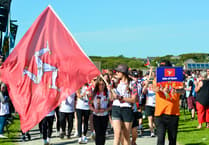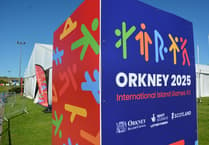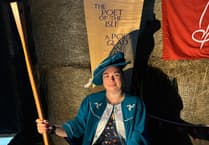A volunteer from the Isle of Man has just returned from a 3,000-mile trip to the Poland-Ukrainian border, where along with four friends he delivered three van-loads of aid supplies to refugees fleeing the Russian invasion.
Marcus Thornton had launched an appeal to collect items (ranging from medical supplies to baby formula) and after a big response from the island’s community was able to fill a rented van, which he drove to the Polish border town of Medyka, via Dover and Germany.
He was joined in England by friends Dave Wright, John Penman, David Hickie and Martin Price, who brought two extra vans full of supplies.
In Medyka, they came within 100 metres of the Ukranian border, until a Polish police officer, who said that too many people were coming through at that time, directed them instead to turn back to the nearby city of Przemyśl – where they could drop the supplies off to aid workers at a Tesco warehouse which was serving as a drop off point attached to a refugee camp.
There they joined a long line of lorries waiting to drop off supplies, with the third van later being unloaded at a distribution centre in Kraków.
Mr Thornton, who lives in Port St Mary, said he had witnessed striking scenes of ‘miles and miles’ of coaches and buses filled with women and children travelling though Poland, away from the war.
Likewise on the way back, they passed more streams of these coaches heading the opposite direction, going to pick up more women and children from the border.
The sight which Mr Thornton, who works for Manx National Heritage, said affected him most was of a young girl waiting at Przemyśl train station, enjoying blowing bubbles from a bottle.
‘It seemed just for a few seconds she forgot the trauma and pain,’ he said.
Reflecting on what he had seen on the journey back, Mr Thornton said that ‘the overwhelming feeling was just the complete sense of bewilderment’.
‘Three weeks, ago, these people were living their lives like you and me,’ he said.
He continued: ‘The women and children [fleeing] – it was really quite surreal, for what we’ve seen on the television in other parts of the world to be happening in Eastern Europe.’
‘Even before we got close to the border, it was really emotional to see people just walking along the side of road, women with pushchairs, women with children and suitcases’.
‘It was tougher than I anticipated, in an emotional way,’ he added.
‘I have children myself and to be separated at the border – because the men are not allowed out of Ukraine, they have to stay and fight – that separation must be horrible, absolutely horrible.’
Mr Thornton said the volunteer aid workers were very grateful to receive the supplies, as well as surprised that the group had travelled all the way from the UK to bring them.
He said that the volunteers were expecting to fill the warehouse in 48 hours, with ‘trucks arriving daily’.
Mr Thornton said that he was glad to have made the trip and would never forget it.
As for what advice he would give to someone looking to do the same, he said: ‘Estimate your fuel and double it.’
Germany was particularly expensive when it came to diesel fuel – one of the many economic repercussions of the conflict.





Comments
This article has no comments yet. Be the first to leave a comment.